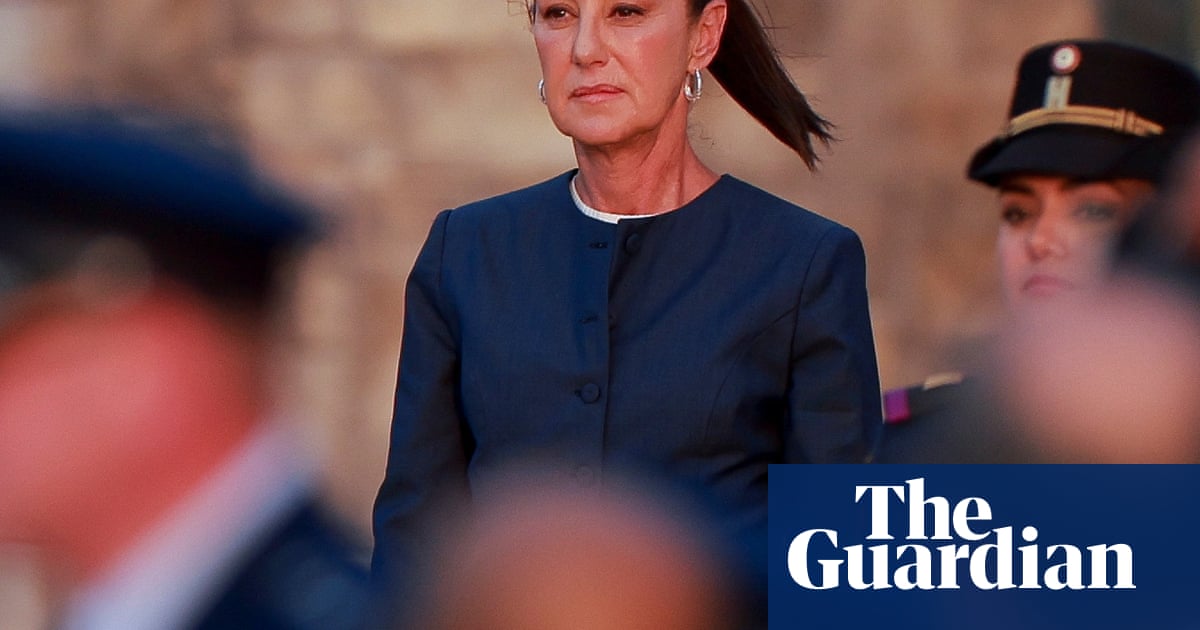A federal judge in Vermont on Friday morning ordered the release on bail of a Tufts University student arrested in March for her political speech and now held in Louisiana in what she and her lawyers argue is a breach of her constitutional rights.
The judge had ordered Rümeysa Öztürk’s return to Vermont, where she was briefly held after being grabbed on the street by masked immigration agents near Boston, for hearings. But the judge decided not to wait for her physical transportation and she appeared remotely from Louisiana at the hearing in Burlington on Friday.
The ruling to release her came at the end of a hearing where the judge, William Sessions, said that the process by which she was placed in immigration detention “raises very significant due process concerns”.
On 25 March, Öztürk, 30, a Turkish national and PhD student studying child development, had been bundled into an unmarked car by agents to be taken away without due process and is battling a deportation order issued by the Trump administration after she co-authored an opinion article in a student newspaper that was critical of Israel.
Sessions said her continued detention “potentially chills the speech of the millions and millions of individuals in this country who are not citizens. Any one of them may now avoid exercising their first amendment rights for fear of being whisked away to a detention center from their home. For all of those reasons, the court finds that her continued detention cannot stand, that bail is necessary to make the habeas [petition] … effective.”
He added: “This is a woman who’s just totally committed to her academic career …there is absolutely no evidence that that she has engaged in violence or advocated violence. She has no criminal record … therefore, the court finds that she does not pose a danger to the community.”
He ordered the Trump administration to release Öztürk from custody “immediately” pending further proceedings, and said she was free to “return to her home in Massachusetts”.
The administration is attempting to deport Öztürk under a rarely used immigration statute giving the secretary of state the authority to remove immigrants deemed harmful to US foreign policy. Her lawyers say it is a flagrant violation of her constitutional right to free speech.
The judge said there was no evidence from the government against Öztürk other than its view of her opinion article and therefore he supported her argument that “the reason that she has been detained is simply and purely the expression that she made … in violation of her first amendment rights.”
She appeared on video at the hearing on Friday dressed in a bright orange prison jumpsuit reminiscent of uniforms for terrorism suspects held at Guantánamo Bay.
According to court filings, Öztürk has suffered multiple asthma attacks in detention that she has struggled to get treated for, and has had her hijab forcibly removed.
Speaking to the judge on Friday, Öztürk said she has suffered 12 asthma attacks since her detention, saying: “Now they are between five to 45 minutes and they are more intense … longer and harder to stop.”
“We are not allowed to take fresh air when we need to take it ... Also there is no divider between the showers,” Öztürk said.
“Also the maximum capacity for the room is indicated … for 14 people but there are 24 people living in a small area, spanning … more than 22 hours inside of the same locked cell,” she added.

Following Öztürk’s initial testimony, her doctor, Jessica McCannon, testified about her diagnosis of Öztürk’s asthma. At one point, Öztürk had an asthma attack during McCannon’s testimony, which her lawyers had to interrupt. The judge then excused Öztürk and allowed her to temporarily step out of the room to use the bathroom.
Addressing the court, McCannon said: “She is at significantly increased risk of developing an asthma exacerbation if not released, that would potentially require emergency evaluation.
“If not treated appropriately and quickly, patients can suffer morbidity and mortality related to asthma exacerbations,” she added.
Sara Johnson, director of graduate studies at Tufts University’s department of child study and human development, who is also Öztürk’s program adviser, also testified.
“Rümeysa is a critical part of our lab … My four PhD students, including Rümeysa, run a peer-review group of all of their work, and they are missing out on her very constructive yet extremely rigorous comments,” she said.
She added: “Rümeysa is also a mentor to many more junior students in our department and so they are missing those opportunities to learn from her.”
Testimony on unsanitary conditions in detention echoes other accounts from detainees and immigration advocates who have reported rotten food and the denial of medical care in the facility in Basile, Louisiana, which is among a series of facilities in the state.
Öztürk’s legal team – which includes the ACLU and Clear (Creating Law Enforcement Accountability & Responsibility), a legal clinic affiliated with the City University of New York – filed a challenge to her detention, in federal court in Vermont.
“I am relieved and ecstatic that Rümeysa has been ordered released. Unfortunately, it is 45 days too late. She has been imprisoned all these days for simply writing an op-ed that called for human rights and dignity for the people in Palestine. When did speaking up against oppression become a crime?” said Mahsa Khanbabai of Khanbabai Immigration Law.
Elizabeth Warren, a Democratic senator for Massachusetts, posted on X: “The Trump administration must release Rümeysa Öztürk right now.”
Öztürk is one of several international students detained by the Trump administration over their pro-Palestinian advocacy on campus.
“The government has spared no effort to evade accountability and deny her due process. Today, the court delivered reprieve and justice,” said Mudassar Toppa, a staff attorney at Clear.
Reuters and the Associated Press contributed reporting

 6 hours ago
2
6 hours ago
2













































